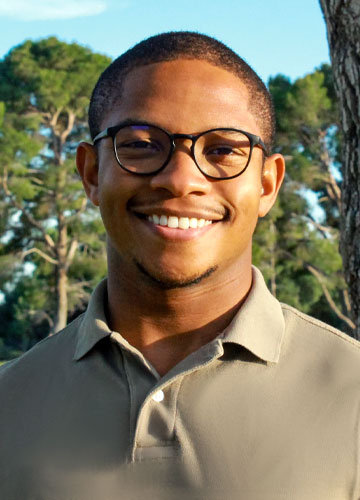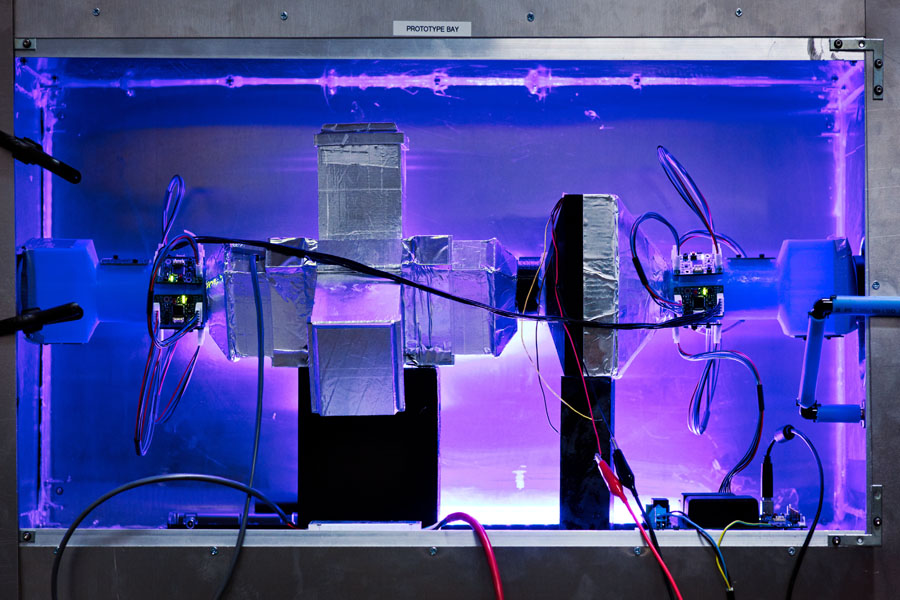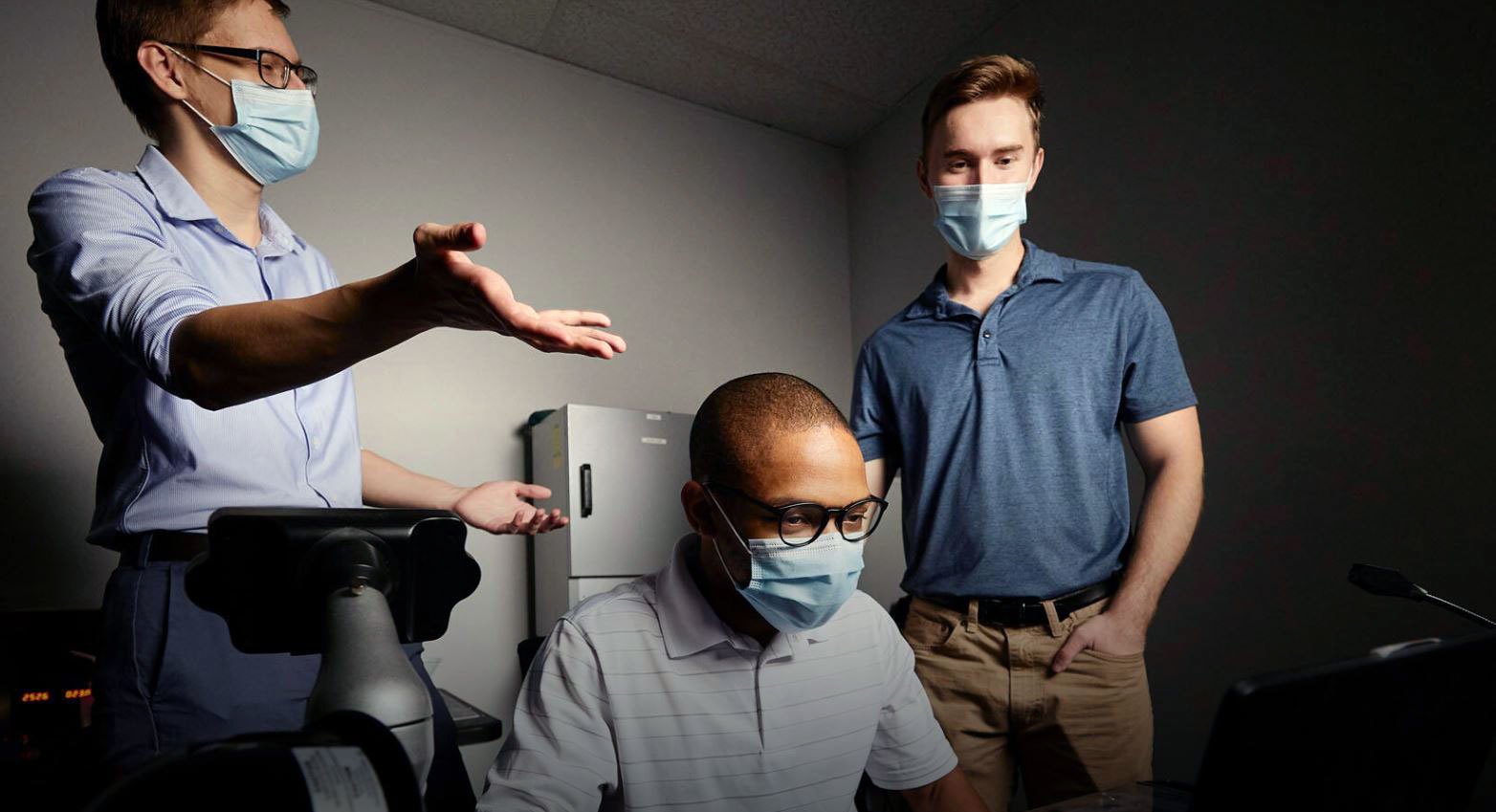SURF student turned entrepreneur seeks high impact with HVAC disinfection tool for COVID-19

As Dr. David Warsinger, assistant professor in the School of Mechanical Engineering, says, "The current paradigm in building air treatment is that it's good enough to recirculate most of the air, and send some portion outside. This has contributed to air pollution, but has largely been ignored in the past. COVID has shown us that this is not good enough - we need to actively make our air safer to protect ourselves, and the environment."
This is exactly what former Purdue Engineering SURF student Xavier Morgan is working to do. In October, five finalists were chosen to receive the Lee School Prize for Innovation and Entrepreneurship, a world-wide $1,000,000 prize created at the University of Nevada-Las Vegas Lee Business School. The goal of the prize competition was to discover and fund innovative technologies and solutions that make the food and beverage, hospitality, casino, sports and entertainment, and travel industries a safe place for employees and guests in the post-COVID world. One of the finalist companies was Promethium, launched by Morgan, who won $250,000 for the development of its photocatalytic technology for air purification. Promethium is providing some of the prize money to the Purdue team to support its next-generation prototype, which will include a Senior Design Team in Warsinger’s course.
The program that brought Morgan to Purdue, the College of Engineering’s Summer Undergraduate Research Fellowship, is a summer research program that is open to Purdue students as well as undergraduate students enrolled at U.S. colleges and universities. The program matches undergraduates with a faculty member and graduate student mentor who introduce the students to research tools used on the cutting edges of science, engineering, and technology. In summer 2019, Morgan was matched with Warsinger to research novel photocatalytic degradation techniques.
As Morgan notes, "Promethium was conceived in 2019 to introduce the bond-breaking strength of photocatalysis to the market. As a SURF student in Purdue’s College of Engineering, I met and worked under Dr. David Warsinger. This started a long-term relationship with the lab and Warsinger, and opened the door to collaboration with Promethium.” Warsinger is serving as a mentor for the start-up company and its PLANT technology.

Promethium's PLANT system combines the power of High Efficiency Particulate Air (HEPA) filtering and the disinfecting power of ultraviolet-C (UVC) lamps to efficiently disinfect hotel rooms, stadiums and even aircraft at up to 10 times the current speed with improved efficiency.
The technology will integrate into existing heating, ventilation and cooling (HVAC) systems. The team is working on prototypes this fall and hopes to begin production in early 2021. To hear more about its product, watch Promethium’s pitch at: https://www.youtube.com/watch?v=tjeuD5ASsF4&feature=youtu.be".

The company continues testing, disinfection science, and product development with Purdue in the Center for High Performance Buildings (CHPB), which was launched in 2016 through a construction grant from the National Institute of Standards and Technology (NIST). The CHPB contains a number of unique facilities for studying building systems and equipment. The group’s mission is to partner with industry to develop, demonstrate, and evaluate new technologies and analysis tools that can enable dramatic improvements in the performance of buildings in terms of energy, environmental impact, and occupant satisfaction and productivity. The Center is led by James Braun, Herrick Professor of Engineering in the School of Mechanical Engineering. Beyond Promethium’s prototype, the team is also conducting scientific research on COVID disinfection with the labs of Chip Blatchley, Lee A. Rieth Professor in Environmental Engineering and professor in the School of Environmental and Ecological Engineering, and W. Travis Horton, associate professor in the Lyles School of Civil Engineering and member of the CHPB. The three-member faculty team led by Warsinger won a seed grant for $65,000 from the CHPB to study the scientific aspects of COVID disinfection by photocatalysis in HVAC systems. Promethium will provide further resources and manpower for this effort.
As Warsinger says, "Destroying chemicals or pathogens in the air is very challenging, as the volumes to treat are huge and the radical molecules that can destroy hazards don't travel well or react as quickly in a gaseous state. Thus with Promethium’s PLANT technology, the goal is to employ new physics and photocatalytic chemistry to tackle this challenge."
Both Blatchley and Warsinger are also affiliates of Purdue’s Center for the Environment, located at Discovery Park. The Center promotes proactive, interdisciplinary research, learning, and engagement that addresses important environmental challenges. It connects the faculty and students across departments and disciplines who work on environmental challenges by actively supporting the development and implementation of innovative research projects and teams. The Center also increases the impact of Purdue's work on important environmental issues through outreach and stakeholder engagement activities.
Sources: Xavier Morgan, xavier@promethiumltd.com or David Warsinger, dwarsing@purdue.edu. For more information on Promethium, contact Morgan or Warsinger.
Writer: Lynne Dahmen, Managing Director, Center for the Environment, ldahmen@purdue.edu
